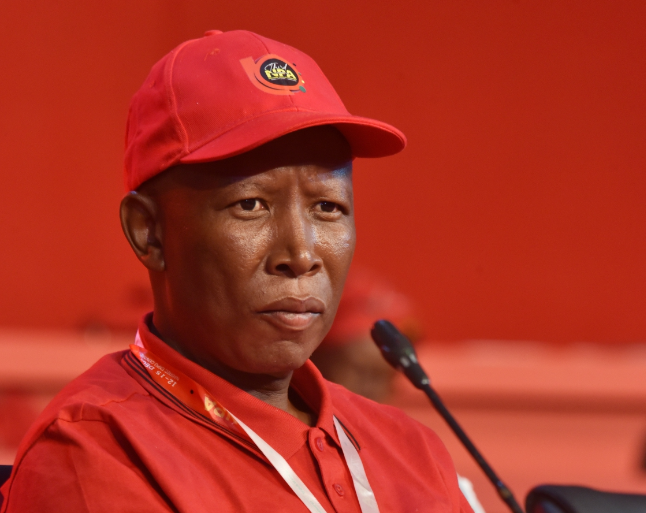It’s been quite a whirlwind in our political landscape lately. Let’s chat about the latest buzz surrounding the Economic Freedom Fighters (EFF) and their potential involvement in a government of national unity (GNU). It’s a hot topic, especially after Julius Malema’s re-election as EFF president during their recent policy and elective conference. Grab a cup of coffee, and let’s dive into the details!
Malema’s Stance on the GNU
Our friend Julius Malema has been making some interesting statements lately. He’s made it clear that the EFF is open to joining the GNU, but not for the reasons you might think. Malema insists that their participation would be all about serving the people, not throwing a lifeline to the ANC.
“We’re not here to save any political party. We’re here for you, the people of South Africa,” Malema emphasized during his speech.
But here’s the kicker – Malema seems to think the GNU won’t last long. He’s hinting that the EFF is ready to swoop in when it all falls apart. It’s like they’re waiting in the wings, ready for their cue to enter the political stage. That is an interesting strategy.
Election Results and Coalition Dynamics
Now, let’s talk numbers for a moment. The ANC has taken quite a hit in the last general election, with their support dropping to a mere 40%. That’s a big deal, folks! This shake-up has led to the formation of a GNU involving nine parties, including some heavy hitters like the DA, IFP, and Freedom Front Plus.
It’s like a political potluck, with everyone bringing something different to the table. But as we know, too many cooks can spoil the broth. Will this diverse coalition be able to work together effectively? Only time will tell.
EFF’s Electoral Performance
Speaking of numbers, the EFF has seen a slight dip in their national support. They’ve gone from 10.8% in 2019 to 9.5% in 2024. It’s not a massive drop, but in the world of politics, every percentage point counts.
What’s interesting is that Jacob Zuma’s MK Party has managed to overtake the EFF in terms of electoral support. It’s like a new player has entered the game and is shaking things up. The political landscape is certainly keeping us on our toes!
Coalition Negotiations and Exclusions
Now, here’s where things get a bit spicy. The EFF has laid down a condition for joining the coalition – they want the DA and FF Plus out. It’s like saying, “We’ll come to the party, but only if those two aren’t invited.”
On the flip side, the DA is standing firm, refusing to form a coalition with either the EFF or the MK Party. It’s like a political game of musical chairs, and everyone’s trying to secure their seat before the music stops.
EFF’s New Leadership Structure
Let’s talk about the EFF’s internal shakeup. They’ve elected a new Central Command Team (CCT) and top six leaders. It’s like they’re getting a fresh coat of paint and some new furniture.
Some key appointments to keep an eye on:
- Goodrich Gardee is stepping up as Deputy President, taking over from Floyd Shivambu.
- Nontando Nolutshungu is the new Chairperson, replacing Veronica Mente.
- Leigh-Ann Mathys is now Deputy Secretary General, filling Poppy Mailola’s shoes.
These changes could bring new energy and ideas to the party. It’ll be interesting to see how these new leaders shape the EFF’s direction going forward.
Party Reforms and Resolutions
The EFF isn’t just changing faces; they’re also making some structural changes. They’ve decided to do away with regional structures and replace them with sub-regions. It’s like they’re reorganizing their political filing cabinet for better efficiency.
They’re also transforming the EFF Student Command into a broader youth structure for ages 14-30, regardless of whether they’re in higher education or not. It’s a smart move to engage with more young people.
Challenges Ahead for the EFF
Now, the EFF’s new leadership team has their work cut out for them. They need to figure out how to turn things around before the 2026 municipal elections. It’s like they’re planning a comeback tour, and they need to make sure it’s a hit.
They’ll need to strengthen their internal structures and find ways to appeal to a broader audience. It’s not an easy task, but politics is all about adapting and evolving.
Conclusion
As we wrap up our chat about the EFF and the current political landscape, it’s clear that we’re in for some interesting times ahead. The EFF is evolving, both in leadership and strategy, and they’re positioning themselves for whatever comes next in South African politics.
The GNU dynamics are certainly shaping our political landscape, and the EFF is trying to carve out its place within it all. It’s like a chess game, with each party making careful moves and trying to anticipate what comes next.
What do you think about all of this? Are you excited about the potential changes, or are you concerned about the political maneuvering? Whatever your thoughts, one thing’s for sure – South African politics is never dull!

